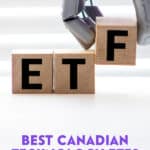Best Canadian Technology ETFs: How to Buy the Tech Sector

Canadian investors love their dividends, and I recently published a list of the top Canadian Dividend ETFs. Now, it’s the tech sector’s turn. Did you know that you can purchase exchange-traded funds in Canada, specifically focusing on technology companies?
They don’t pay much in the way of dividends, but they offer concentrated exposure to a high-growth sector of the economy.
In this article, I’ll explain how tech ETFs work and cover everything you need to know, from management fees to the largest holdings to assets under management and which ones invest in Canadian companies.
What Is a Technology ETF?
A tech ETF is an exchange-traded fund comprised almost entirely of stocks from the technology sector. Because of their narrow focus, tech ETFs are riskier than a broad index fund. Tech ETF MERs tend to be higher than whole market funds, which is something to keep in mind, given that low MERs are one of the top reasons investors purchase ETFs.
You may wonder why you would buy tech stocks inside an ETF when you can purchase the individual stocks themselves, like Apple or Shopify. While tech ETFs are risky, it’s much easier to diversify your investment in an ETF.
As volatile as a tech ETF might be, you take more risk if you only purchase one or two individual technology stocks. It’s also more cost-efficient to buy an ETF, as you can hold many stocks for a low price.
8 Best Canadian Tech ETFs
There is no shortage of tech ETFs available on the Toronto Stock Exchange. I’ve chosen eight funds for this list, each offering something a little different.
If Canadian tech companies are what you’re after, XIT from IShares will interest you. On the other hand, TDs Global Technology Leaders ETF will give you access to all of the top US technology companies for a very low cost (0.39% MER).
And if you are looking for exposure to a specific geographic region or industry sector, I’ve included ETFs to cover those. Without further ado, let’s get to the list!
TD Global Technology Leaders ETF
Ticker: TEC
MER: 0.39%
Dividend Yield: 0.70%
Number of Stocks: 284
AUM: $1.25 Billion
Inception: May 6, 2019
Benchmark: SolactiveGlobal Technology Leaders Index.
Notable Holdings: Apple, Microsoft, Amazon, Tesla, Alphabet, Meta (Facebook), Visa, Mastercard.
As per the fund overview on their website, “the TD Global Technology Leaders Index ETF seeks to track, to the extent reasonably possible and before the deduction of fees and expenses, the performance of a global equity index which measures the investment return of global mid- and large-capitalization issuers related to technology.” It’s interesting that the fund is not committed to a specific index. Currently, that index happens to be SolactiveGlobal Technology Leaders Index.
I like this fund. Its MER is lower than many other funds, and you get exposure to the US, European, and Japanese tech sectors in one ETF. TEC has been around since May 2019, and it’s great to see a Canadian bank come to the table with a strong ETF offering.
BMO NASDAQ 100 Equity Index ETF
Ticker: ZNQ
MER: 0.96%
Dividend Yield: 0.00%
Number of Stocks: N/A
AUM: $95 Million
Inception: June 1, 2021
Benchmark: NASDAQ 100 Index
Notable Holdings: BMO NASDAQ 100 Equity Index ETF
As its name suggests, the BMO NASDAQ 100 Equity Index ETF invests primarily in stocks listed on the NASDAQ 100 Index. The fund’s objective states that it may purchase an ETF that holds these securities or own the underlying securities themselves. This fund is a top choice if you are a Canadian investor looking to have primarily US tech stocks that trade on the NASDAQ. The MER is on the high side, at 0.96%.
Invesco NASDAQ 100 Index ETF
Ticker: QQC
MER: 0.22%
Dividend Yield: N/A
Number of Stocks: N/A
AUM: $517 Million
Inception: May 27, 2021
Benchmark: NASDAQ 100 Index
Notable Holdings: Invesco QQQ and Invesco QQQM
The Invesco NASDAQ 100 Index ETF is part of the Invesco Canada fund family and seeks to replicate the performance of the NASDAQ 100 Index. Unlike other tech ETFs, which purchase individual stocks on an index, it holds two USD ETFs, QQQ and QQQM, hedged to the Canadian dollar.
iShares S&P/TSX Capped Information Technology Index ETF
Ticker: XIT
MER: 0.61%
Dividend Yield: 0.00%
Number of Stocks: 25
AUM: $360 Million
Inception: March 19, 2001
Benchmark: S&P/TSX Capped Information Technology Index
Notable Holdings: Constellation Software, Shopify, CGI Inc, Blackberry LTD, Lightspeed Commerce
If you’re looking for exposure to Canadian tech companies, iShares S&P/TSX Capped Information Technology Index ETF is a good choice. It’s comprised of 25 Canadian tech stocks and seeks to replicate the performance of the S&P/TSX Capped Information Technology Index.
One downside to this fund is that it’s top-heavy; the top two holdings (Constellation and Shopify) make up 50% of overall holdings. This is not surprising, however, given the small size of Canada’s tech industry relative to the US.
Invesco Golden Dragon China Index ETF
Ticker: PGJ
MER: .69%
Dividend Yield: 0.26%
Number of Stocks: 72
AUM: $279 Million
Inception: December 9, 2004
Benchmark: Nasdaq Golden Dragon China Index
Notable Holdings: Alibaba, Baidu, Trip.com
The Invesco Golden Dragon China ETF invests 90% of its total assets in companies that earn most of their revenue in China. The fund is based on the Nasdaq Golden Dragon China Index. The companies on the index are listed on the NASDAQ exchange in the US. The fund is only available in US dollars, so Canadian investors must factor foreign exchange into the equation.
If you’re interested in gaining exposure to Chinese companies, this ETF is likely your best bet. An important note – this is not an exclusive tech ETF – there are several industry sectors represented, the most prominent being consumer discretionary, at 56% of overall holdings.
Harvest Tech Achievers Growth and Income ETF
Ticker: HTA
MER: 0.99%
Dividend Yield: 8.24%
Number of Stocks: 20
AUM: $272 Million
Inception: May 26, 2015
Benchmark: S&P 500 Information Technology TR USD
Notable Holdings: Advanced Micro Devices (AMD), Texas Instruments Inc., Apple, Intuit Inc., Google, Adobe, Microsoft
The Harvest Tech Achievers Growth and Income ETF offer investors exposure to 20 of the largest global technology stocks spread across several sub-sectors, like semiconductors, software, interactive media, and communications equipment. One thing that stands out about HTA is its incredibly high dividend yield, which currently stands at 8.4% as of July 2022. This is a huge bonus, as most tech stocks pay little to no dividends.
ARK Innovation ETF
Ticker: ARKK
MER: 0.75%
Dividend Yield: N/A
Number of Stocks: 35-55
AUM: $9.3 Million
Inception: October 31, 2014
Benchmark: N/A
Notable Holdings: Tesla Inc, Zoom, Roku, Exact Sciences Corp, Block Inc
Unlike most of the funds on our like, the ARK Innovation ETF is an actively managed fund. In other words, it’s not merely seeking to replicate a specific index. Instead, the fund’s managers follow a “disruptive innovation” theme, companies that rely on developing new products and services.
One doesn’t need to look past the top two holdings, Tesla, and Zoom, to get an idea. As you can imagine, this is a highly volatile fund and should not comprise a significant portion of even the most aggressive investment portfolio. 93% of the fund’s assets are invested in North America.
Evolve Cyber Security Index ETF
Ticker: CYBR
MER: .40%
Dividend Yield:
Number of Stocks:
AUM:
Inception: September 18, 2017
Benchmark: Solactive Cyber Security Index (Canadian Dollar Hedged.)
Notable Holdings: Palo Alto Networks Inc, Checkpoint Software Technologies, Crowdstrike Holdings, and Fortinet Inc.
Much like ARKK, Evolve’s CYBER Security Index ETF has a narrow investment focus, proclaiming itself as Canada’s first cyber security ETF. Unlike ARKK, it’s an index-based ETF and tracks the Solactive Cyber Security Index (Canadian Dollar Hedged.) Prominent holdings include Palo Alto Networks Inc, Checkpoint Software Technologies, Crowdstrike Holdings, and Fortinet Inc. The fund’s geographic allocation is well diversified, with holdings in 9 countries in North America, Europe, Asia, and Australia.
What Is the NASDAQ 100 Index?
Many ETFs on our list (the ones that invest in the US technology sector) use the NASDAQ 100 Index as their benchmark. But what is the NASDAQ 100 Index? It’s a stock market index comprised 102 of the largest companies on the NASDAQ stock exchange, not including financial companies like banks and insurance companies. They have their index, called the NASDAQ Financial 100. The index’s top five stocks include Apple, Microsoft Corp., Amazon.com, Tesla, and Alphabet (Google). The index has a total AUM of $162 Billion as of September 2022.
Canadian Tech ETF Pros and Cons
The decision to purchase any type of investment is an individual one. Canadian tech ETFs are not for everyone. Here is my list of pros and cons to help you decide what place technology companies have in your portfolio.
Technology ETF Pros
- Concentrated focus on the technology sector
- Lower MERs than actively traded mutual funds
- Potential for long-term capital growth
- Better diversification than with individual stocks
Technology ETF Cons
- Extremely high-risk
- Higher MERs than broad market index ETFs
- Most tech ETFs pay little to no dividend yield
- Some funds have a small market cap
How to Buy Technology ETFs in Canada
The easiest way to purchase any type of ETF is through an online brokerage account. Most discount brokers offer slick mobile apps for trading on the go, and you can buy ETFs commission-free, depending on which broker you use.
Our top ETF broker picks are Questrade and Wealthsimple Trade. Both platforms offer free ETF purchases, and Wealthsimple Trade is mobile-only and is better for beginners, while Questrade can handle more sophisticated trading scenarios. For more information, check out our reviews of Questrade and Wealthsimple Trade.
Does a Canadian Tech ETF Belong in Your Portfolio?
There you have it, our guide to the best tech ETFs in Canada. After reading, you may still wonder whether tech ETFs belong in your portfolio. My first thought is this: before buying any new investment, seek sound investment advice from a professional advisor.
Remember, all of the Canadian tech ETFs on our list are highly volatile, and their value can rise and fall sharply from year to year. You could lose some or all of your money. Also, don’t expect dividend yield with a tech ETF; that’s what dividend stocks and ETFs are for.
The right tech ETF might be a fit for a small portion of your portfolio (5% or less) if you’re looking for a way to take a more aggressive stance and increase your potential for long-term capital growth.

